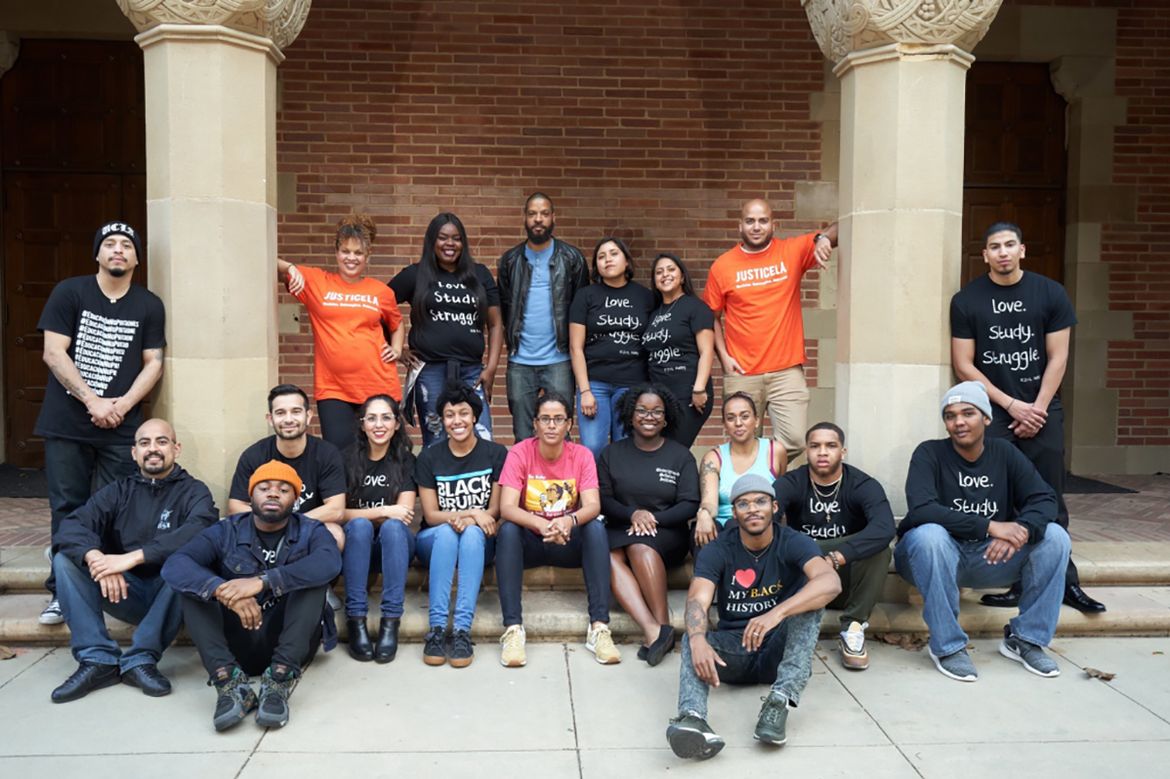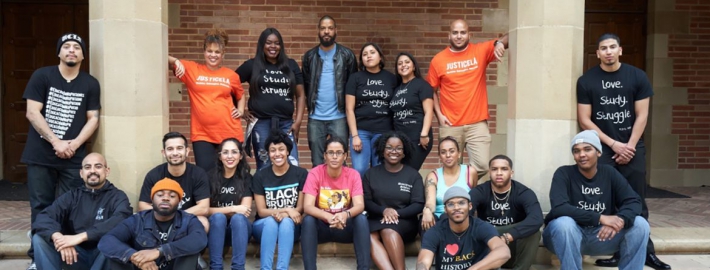Million Dollar Hoods is already influencing policing in Los Angeles

Students, staff and faculty members of Million Dollar Hoods. Less than five years old, the effort has nevertheless helped shape Los Angeles and California law enforcement policy in several areas. (Photo Credit: Leroy Hamilton)
In less than five years, Million Dollar Hoods has already begun to influence criminal justice and policing in Los Angeles.
The program, launched in 2016, produced research on cannabis enforcement that shaped the development of the city’s Social Equity Program, which addresses the impact of disparate enforcement of cannabis prohibition. Its research on the money bail system, the first to document the scale of money bail in a large U.S. city, was instrumental to the passage of California legislation ending money bail for misdemeanor and nonviolent felony cases.
Its report on the Los Angeles School Police Department helped persuade the Los Angeles Unified School District to stop arresting children 14 and younger. And its analyses of Los Angeles Police Department arrests of homeless people unmasked the fact that arrests are outpacing the growth of the city’s homeless population — revealing an escalating focus on policing homeless persons.
Million Dollar Hoods is a big-data research initiative based at UCLA that uses Los Angeles police and jail records to monitor how much authorities are spending to lock up residents, neighborhood by neighborhood. In some communities, that figure is more than $1 million per year.
And not every neighborhood is affected equally by Los Angeles’ massive jail system. Data from arrest records shows that Los Angeles’ jail budget, nearly $1 billion per year, is largely devoted to incarcerating people from just a few neighborhoods.
Million Dollar Hoods researchers have researched and written dozens of “rapid response reports” in response to concerns from community members. Each report is made available on the program’s website.
Million Dollar Hoods researchers have also interviewed nearly 200 Los Angeles residents, under the guidance of Terry Allen, the lead researcher and director of the oral history project and a recent doctoral graduate of the UCLA School of Education and Information Studies. The oral histories tell stories of individual experiences of dealing with police and being arrested or incarcerated, as well as the impact of incarceration on families.
Its research team is led by Kelly Lytle Hernández, a UCLA professor of history and urban planning, and includes UCLA students, staff and faculty. Every project also benefits from the involvement of community organizations; Youth Justice Coalition, Los Angeles Community Action Network, Dignity and Power Now!, and JusticeLA are among those that have contributed to recent projects.
The project has attracted a passionate collective of undergraduate researchers, said Marques Vestal, faculty advisor for Million Dollar Hoods.
“There are lines out the door to get involved with this project,” said Vestal, a UCLA postdoctoral fellow and leader on the Million Dollar Hoods team who will joins the faculty of UCLA’s department of urban planning in July 2021. “Million Dollar Hoods gives students the chance to work with big data in ways that have a reparative impact on their communities.”
Next up: Thanks to a portion of a $3.65 million grant from the Andrew W. Mellon Foundation, Million Dollar Hoods will expand its capacity to produce oral histories — including training students to conduct interviews — and digitize more records and work with members of the community to document their experiences with and perspectives on mass incarceration.
This article, written by Jessica Wolf, originally appeared in the UCLA Newsroom.




